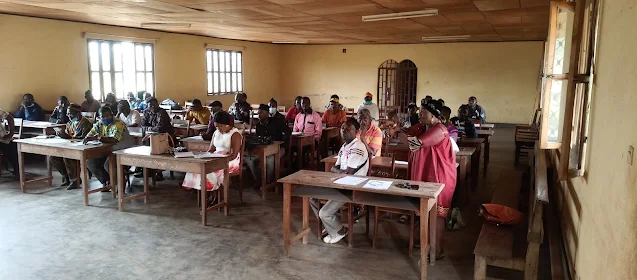The PC Naikom women’s center, in Wum, Menchum Division of the North West Region, played host to a one day workshop on the training of over thirty community based leaders (CBLS), on monitoring public investment projects.
Organized by the North-West Association of Development Organizations NWADO, the workshop falls within the ambit of the Active Citizenship Strengthening Program (PROCIVIS) in Cameroon, and was held under the thematic of “Strengthening civil society in the formulation and monitoring of public policy and the promotion of the rule of law and peace”.
The raison d’être of the workshop was to strengthen the capacity of Community Based Leaders (CBLs) to monitor public investment projects in their communities and carry out whistle blowing on wrong doings in the execution of public contracts. It also aimed at increasing the knowledge of CBLs on techniques of monitoring public investment projects, enable them understand and access on sim tools for project monitoring as well as putting in place Divisional quality control teams for coordination of actions and effective follow up of public investment projects in the field.
The rational of the workshop is as a result of the fact that our country Cameroon has been rated twice as 1st and 2nd most corrupt country in the world by Transparency international between 1998 and 2000 and today still falls in the list of most corrupt nations. In April 2011, the National Anti-Corruption Commission estimated that over 70 billion is lost in private pockets through non execution of contracts and in 2010, MINEPAT received 920 petitions relating to wrong doing in the execution of public contracts. Just like other regions, the North West Region has suffered similar faith where projects e.g. roads and bridges start wearing off the next day, whereas the project reception committees have gone ahead to receive the poor works. These malpractices have over the years continued to drain state resources with citizens not having any remarkable changes in their daily lives in spite the many public investments projects in their communities.
With the ongoing crises in the North West region, there are growing fears that non execution of contracts, poorly executed works and abandonment of works, could increase because. This to the simple reason that, unscrupulous individuals could take advantage of the war situation and report on non-executed projects or even validate poor work.
Therefore, to be able to limit such circumstances, Community-Based Leaders, must master the techniques and tools of public investment projects monitoring and quality control. They must also be more aware of their role and become assertive to carry out whistle blowing in case they identify any wrong doing in the execution of projects in their communities.
Facilitated by Eboa Akelendi Ku-Isoh, C.E.O of Step by Step Engineering and Consultancy, who also doubles as the Wum Council Development Officer, an Expert in public investment projects monitoring and quality control, and Njolah Brice Kongnyuy, Finance Officer of NWADO, this capacity building meeting, has empowered Community-Based leaders, traditional leaders, quarter heads, leaders of youth/women groups, leaders of Village Development Unions and councillors in Wum Council area, on the techniques of monitoring projects in their communities and whistle blowing, in case of wrong doing during project execution.
At the end of the exercise, OJ SLIM MEDIA spoke to some participants.
I am very happy that such a workshop came up. Since the creation of our village development committee, we have been sleeping. Our eyes have just been opened. We are ready to wake up from our slumber and impulse development in our community. Kum John, Chairperson Bangwe Village Development Committee.
There is no development without the participation of the grassroots. This workshop is an eye opener to most of us. We have learn to play our role as far development is concerned. We use to fold our arms and wash wrong doings take the central stage in our communities. We have just been empowered to take our destiny into our hands. From today, things will never be the same again. Buo Ephraim Amuh, Councilor Wum Council.
I have learned today that I have the right to be nice to contractors so that they can present their contract specification to us for a proper follow up. On the field, we should not be rude to these contractors. The more we try to be rude, the more they become arrogant. As they become arrogant, they will produce poor works. Ewi Elizabeth, Civil Society Activist.
The organizer of this training exercise is full of expectations, regarding the empowerment of these CBLs, so as to enhance local development.
We expect that after this capacity building meeting, Community Based Leaders should be able to master the techniques of public investment project monitoring, they should also be more aware of their responsibility in monitoring public investment projects in their various communities. We expect them to master and have access to simplified tools and data collection tool to carry out monitoring. Our most important expectation at the end of this meeting is for CBLs to propose an action plan and for a Divisional quality control teams to be put in place. Njolah Brice Kongnyuy Finance Officer NWADO.
By Stephen Ojang in Wum.






Comments